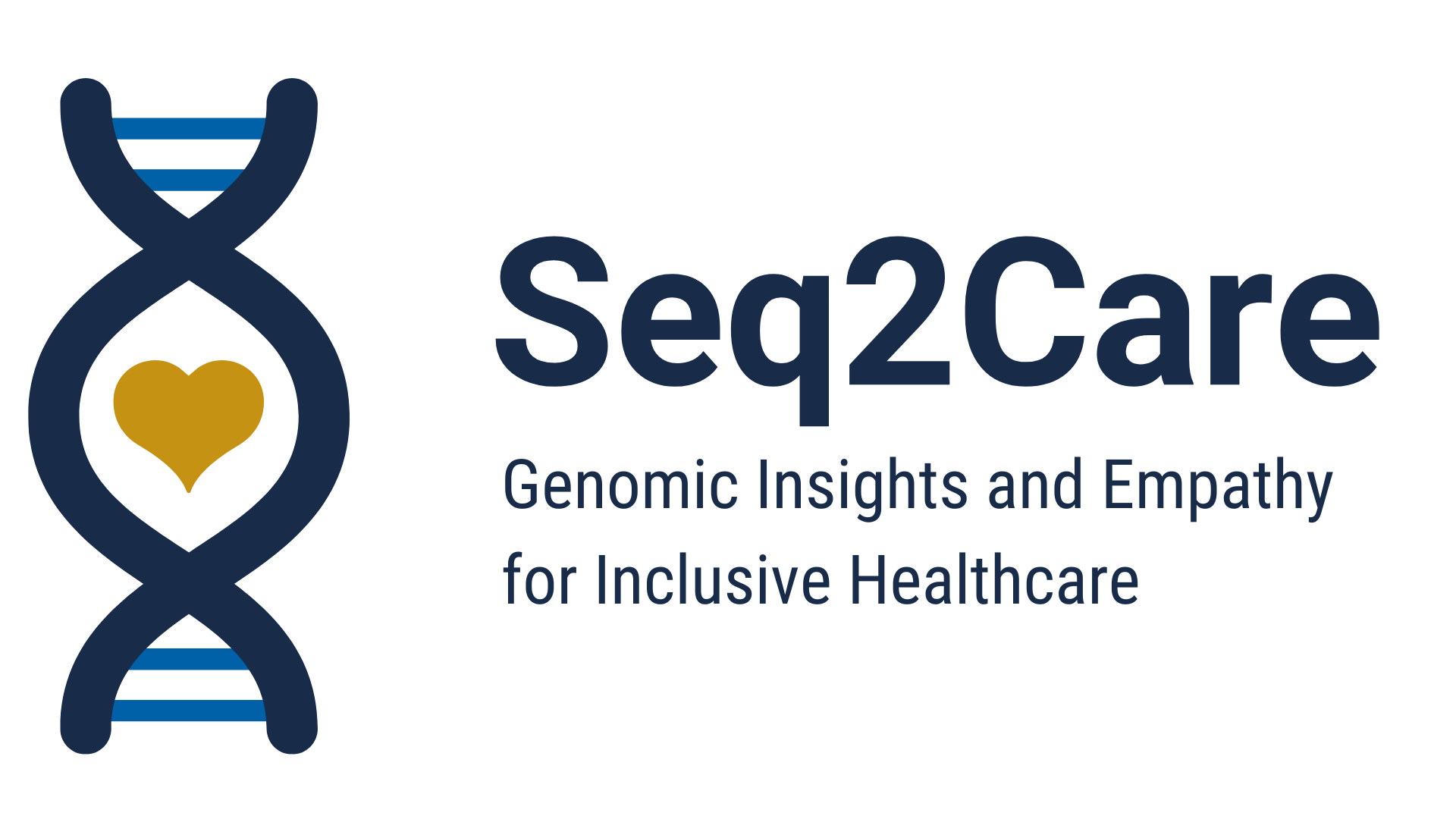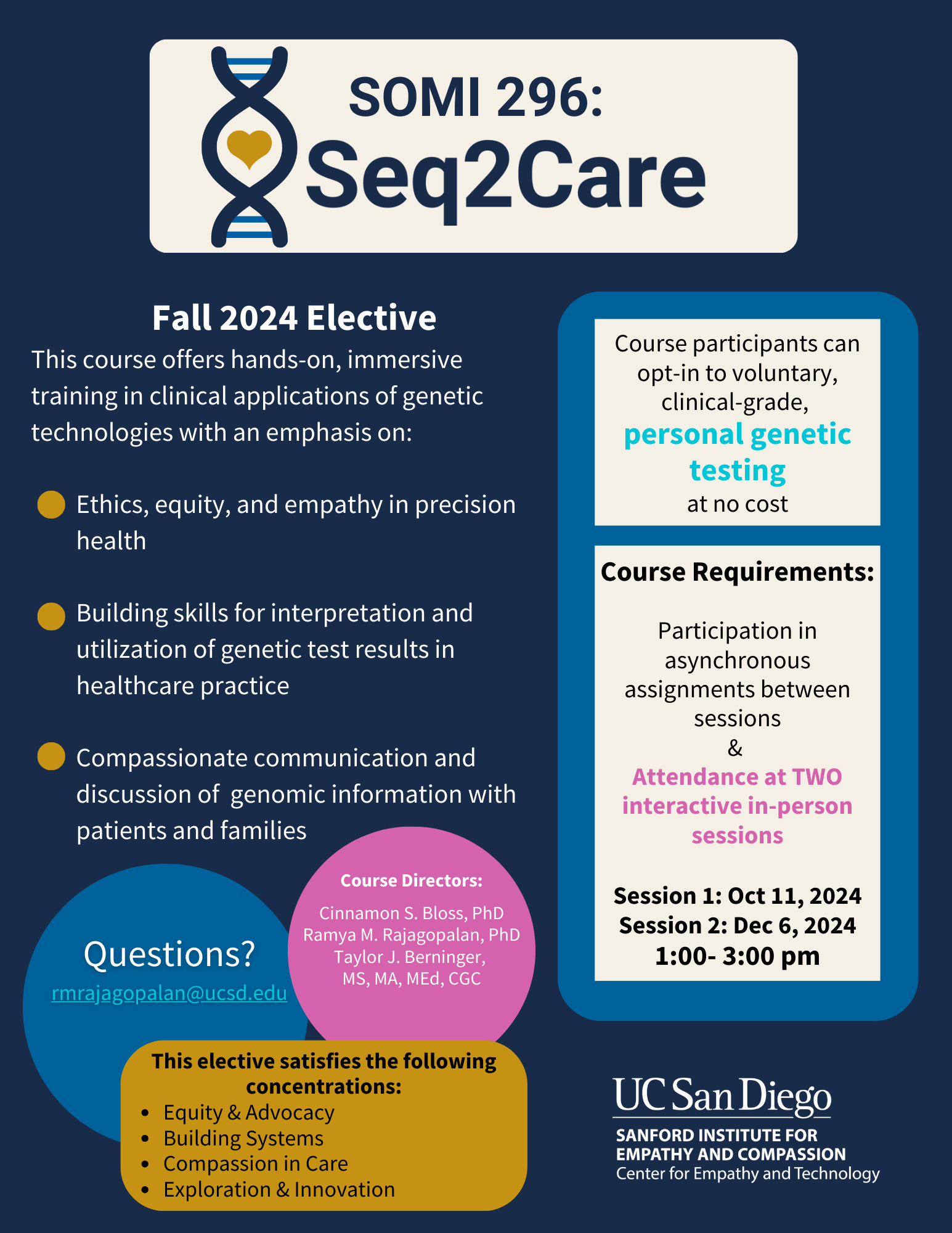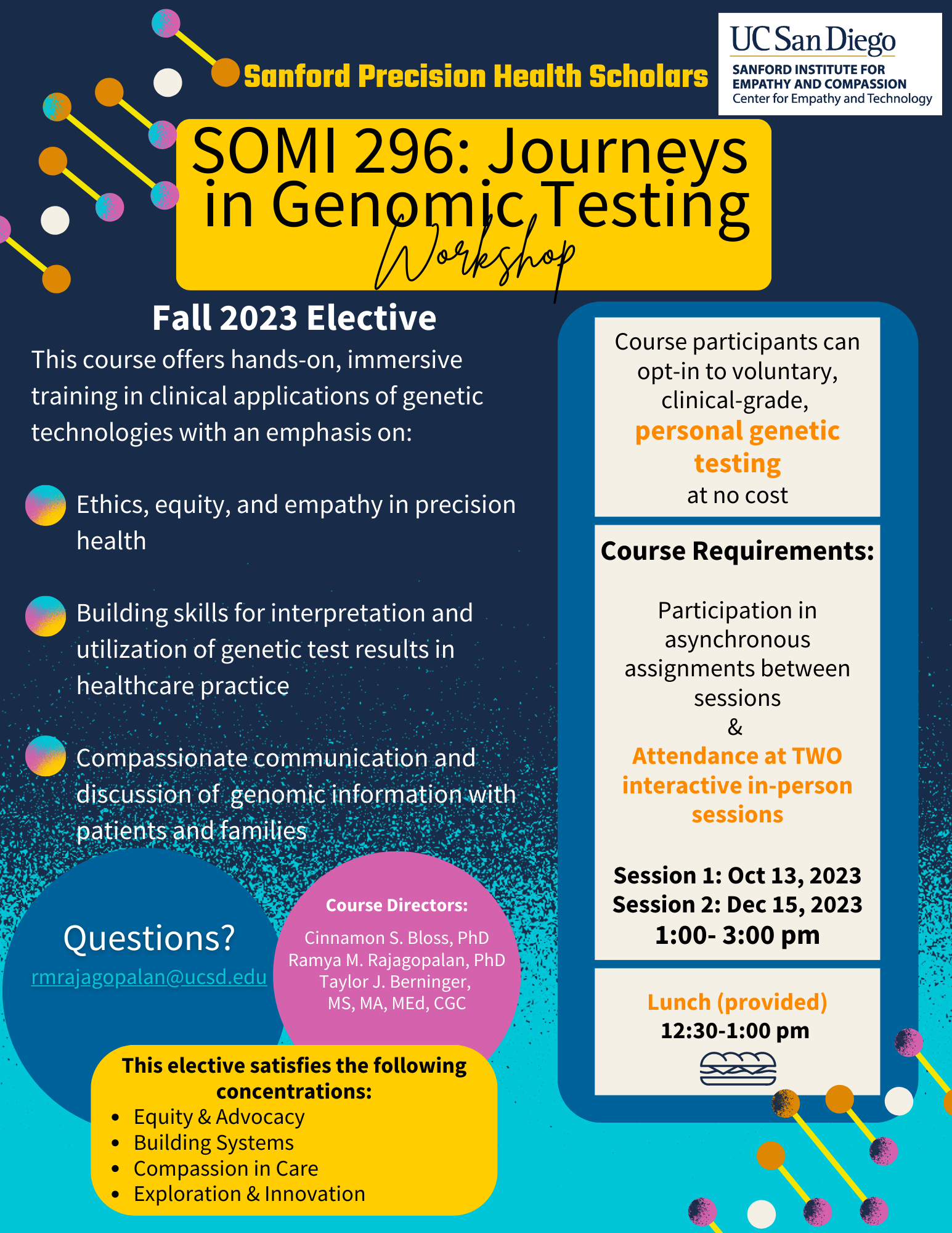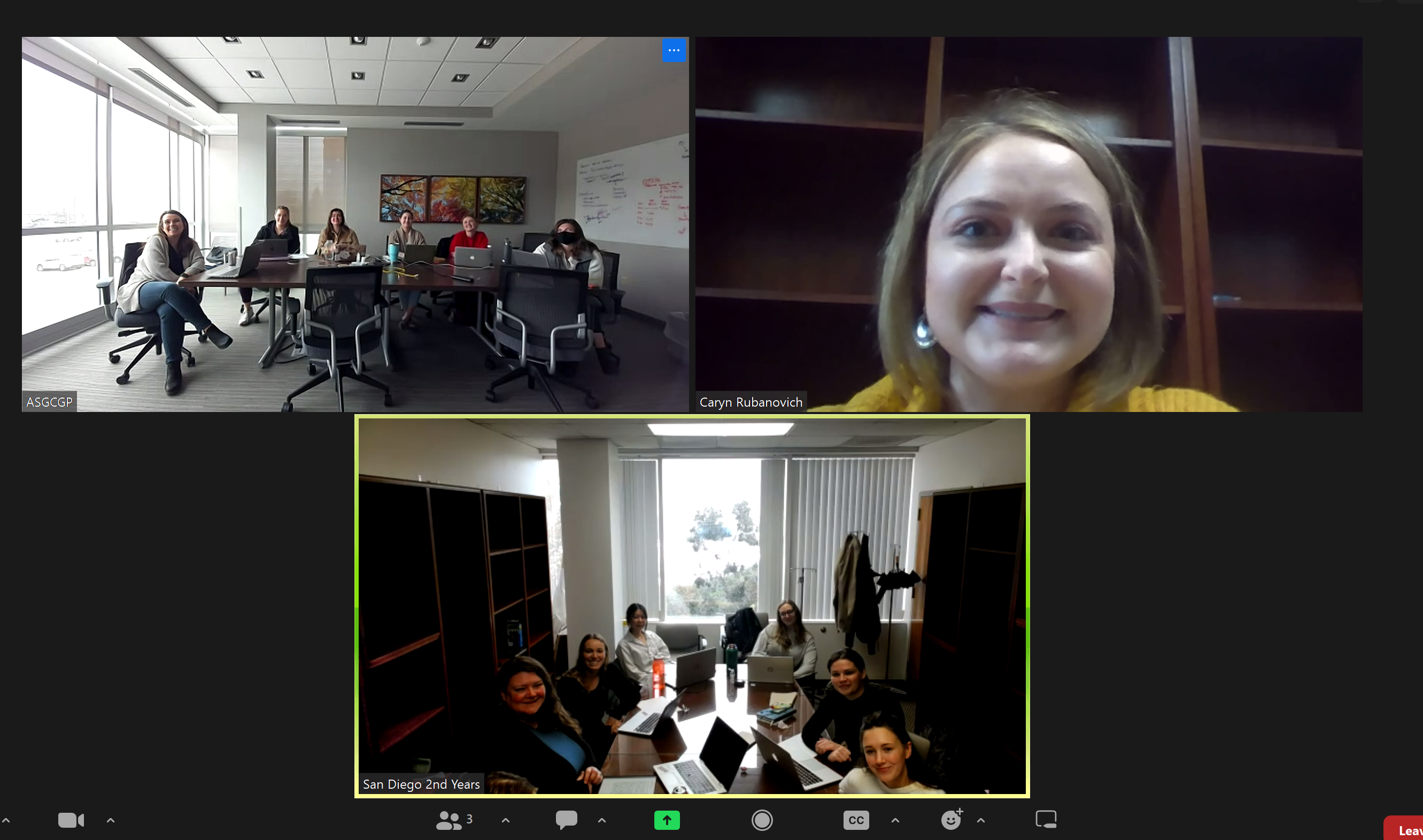Center for Empathy and Technology
- Get to Know Us
- Research
- Education
- Events & Outreach
- Get Involved

The TECH Center designs and implements education initiatives that center the role of compassion, empathy, and equity in the use of healthcare technology. Learners hone skills for compassionately integrating technology into their practice, consider both the benefits and limitations of technological innovations, and examine implications for patient accessibility and equity. Our content is intended to facilitate learners’ understanding of the patient perspective and empowers them to leverage technology to enhance empathetic interactions.
Learn about our flagship academic course at UC San Diego, open to all pre-clinical medical and pharmacy students.

The Seq2Care course (formerly Precision Health Scholars or PHS) aims to offer training and hands-on experience in genomic analysis and interpretation for all eligible pre-clinical medical and pharmacy students at UC San Diego. Our interactive content guides students as they work through strategies for critically engaging with justice, equity, diversity, and inclusion in genomics research and clinical practice. The overall experience is crafted to build empathy and compassion for the diversity of patient needs and journeys in precision healthcare and clinical genomics.
For more information on Seq2Care outcomes and bringing the course to your institution, visit our course webpage.

The new Seq2CareSD Program launches in April 2026! The program incorporates self-paced, asynchronous online modules and culminates in an in-person summer workshop in San Diego in July. Program participants can opt-in to voluntary, clinical-grade, personal genetic testing; costs will be covered by the program. Applications for our inaugural cohort are now closed. Stay tuned for exciting updates and future opportunities to participate!
Learn more about our previous and upcoming course offerings for UC San Diego students.

Skills learned in this course provide a baseline foundation for incorporating genomic healthcare into any specialty. Course activities explore the utility of clinical genomics technologies for identifying and managing hereditary health risks. Key issues of ethics, social justice, and health equity provide real-world framing for strategies that can support the inclusive delivery of genomic healthcare. A central focus is on skill-building to support compassionate interaction, interpretation, and communication of genomic information with diverse patients and families.
Learning activities are delivered through a series of self-paced, asynchronous modules, bookended by two in-person sessions (attendance required). In-class interactions focus on case scenarios, peer-to-peer role plays, and group discussion. For the 2025 elective course, required in-person session will be held:
SOMI 296- Seq2Care: Genomic Insights and Empathy for Inclusive Healthcare

Seq2Care employs an innovative experiential learning approach to develop fundamental skills for integrating precision health tools in clinical settings. Students will have the option to participate in a voluntary, no-cost, secure, clinically validated personal genetic testing experience, to learn about their own genetic variants and engage with course content from a patient perspective. Students will receive an equivalent learning experience regardless of whether they opt-in or opt-out of the genetic testing experience.
Skills learned in this course provide a baseline foundation for incorporating genomic healthcare into any specialty. Course activities explore the utility of clinical genomics technologies for identifying and managing hereditary health risks. Key issues of ethics, social justice, and health equity provide real-world framing for strategies that can support the inclusive delivery of genomic healthcare. A central focus is on skill-building to support compassionate interaction, interpretation, and communication of genomic information with diverse patients and families.
Learning activities are delivered through a series of self-paced, asynchronous modules, bookended by two in-person sessions (attendance required). In-class interactions focus on case scenarios, peer-to-peer role plays, and group discussion.
SOMI 296- Precision Health Scholars: Journeys in Genomic Testing

This two-day workshop offers hands-on training for medical and pharmacy students in clinical applications of genetic technologies, with attention to justice and equity issues in precision health and medicine. Participants have the option to engage in a voluntary, clinically validated personal genetic testing experience through this course, to learn about their own genetic variants and engage with content from a patient perspective. The cost of this experience is covered for participants who opt-in. All workshop participants receive an equivalent learning experience regardless of whether they opt in or opt-out of genetic testing. Workshop content builds understanding of the strengths and current limitations of clinical genomics technologies and an appreciation for the role of empathy and compassion in enhancing patient experiences, in preparation for clinical work in any specialty. Learning activities include asynchronous exercises, in-class role plays and scenarios, and group discussion.
FMPH 491- Race, Equity, Justice, and Technology in Public Health
This course examines emerging technologies and their relevance to public health through the lens of justice, equity, and access, with a focus on how different "precision” technologies can enable or constrain progress towards alleviating disparities across diverse communities. Topics include commercial genetic testing, facial recognition and the law, forensic genetics, marketing and predictive data analytics, digital surveillance, genome editing, and artificial intelligence. Examining relevant case studies, students will learn to identify the potential for bias and recommend strategies for enhancing equity through technology in policy and practice.
SOMI 296- Precision Health Scholars: Journeys in Genomic Testing
This two-day workshop offers hands-on training for medical and pharmacy students in clinical applications of genetic technologies, with attention to justice and equity issues in precision health and medicine. Participants have the option to engage in a voluntary, clinically validated personal genetic testing experience through this course, to learn about their own genetic variants and engage with content from a patient perspective. The cost of this experience is covered for participants who opt-in. All workshop participants receive an equivalent learning experience regardless of whether they opt in or opt-out of genetic testing. Workshop content builds understanding of the strengths and current limitations of clinical genomics technologies and an appreciation for the role of empathy and compassion in enhancing patient experiences, in preparation for clinical work in any specialty. Learning activities include asynchronous exercises, in-class role plays and scenarios, and group discussion.
SOMI 296- Precision Health Scholars Immersive Learning Experiences
This course is designed for pre-clerkship medical students and other health professional students interested in learning about the clinical implementation of genomics and precision medicine. Exploring a variety of case studies, the class encourages students to critically examine the meaning of genomic information and its significance for understanding and treating health conditions. Hands-on learning activities include guided demonstrations, in-class exercises with real-world genetic data and test reports, and opportunities to engage with patient advocates, genetic counselors, leaders from the San Diego genomics community, and genomics experts in industry. By unpacking commonly held assumptions about race, biology, and genetic ancestry, students build a toolkit for precision medicine inspired by the values of compassion, empathy, social justice, and health equity in clinical care.
In addition to designing and facilitating our own unique course content, the TECH Center education team members also contribute their expertise to health care professional training programs, both at UC San Diego and beyond.
TECH Center team members have been invited to provide content for various courses within the Augustana-Sanford Genetic Counseling Graduate Program (ASGCGP) curriculum. Topics have included: Narrative Medicine, Supporting Empathetic Patient Interactions in the EMR, Health Disparities in Historical Context, and Engaging Minoritized Groups in Research.
 Doctoral Trainee Caryn Rubanovich leads 2nd-year
Doctoral Trainee Caryn Rubanovich leads 2nd-year All programs and initiatives coordinated by the Sanford Institute for Empathy and Compassion's Center for Empathy and Technology are designed and implemented in full compliance with Proposition 209 and the University of California Anti-Discrimination Policy.
In accordance with applicable Federal and State law and University policy, the University of California does not discriminate, or grant preferences, on the basis of race, color, national origin, religion, sex, disability, and/or other protected categories.
More information about Proposition 209 can be found here. More information about the University of California Anti-Discrimination Policy can be found here.